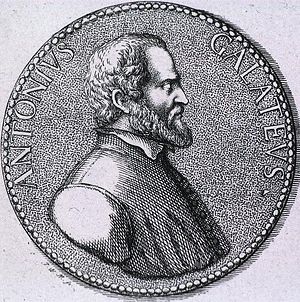Antonio de Ferraris
| Antonio de Ferraris | |
|---|---|

A portrait of Antonio de Ferraris.
|
|
| Born | Antonio de Ferraris 1444 Galatone, Apulia, Kingdom of Naples, Southern Italy |
| Died | 1517 Lecce, Apulia, Kingdom of Naples |
| Occupation | Humanist, Philosopher, Doctor, Academic, |
| Ethnicity | Greek |
| Literary movement | Italian Renaissance |
Antonio de Ferraris (Latin: Antonius de Ferraris, Greek: Ἀντώνιος Φεράρις; c. 1444 – 12 November 1517), also known by his epithet Galateo (Latin: Galateus, Greek: Γαλάτειος), was an Italian scholar, academic, doctor and humanist.
Antonius De Ferraris was born in 1444 in Galatone, located in Salento, in the province of Lecce (Apulia, in southern Italy) to a family of Greek descent. Both his great-grandfather and grandfather were priests in the Eastern Orthodox Church and were fluent in both Greek and Latin literature. His father was also fluent in both Greek and Latin. His family was part of the historical Greek community of Southern Italy. He later wrote of his pride to be descended from Greek ancestors and priests and of the Greek traditions of his province proclaiming: "We are not ashamed of our race, Greeks we are, and we glory in it"
He was commonly called “il Galateo", an epithet he took from the city of his origin Galatone. He used the nickname in almost every document, and the name was also inherited by his children and grandchildren, it ultimately replaced his original family name of “De Ferraris”.
After receiving his education from a maternal uncle who was abbot of the monastery of St. Nicola Pergoleto, Galateus was sent to study in the Gymnasium of Nardò, a center of theological culture where also taught the humanities. Here he learned Greek and Latin texts, and hereinafter guidelines on philosophical and medical matters which came to characterize his cultural journey.
...
Wikipedia
